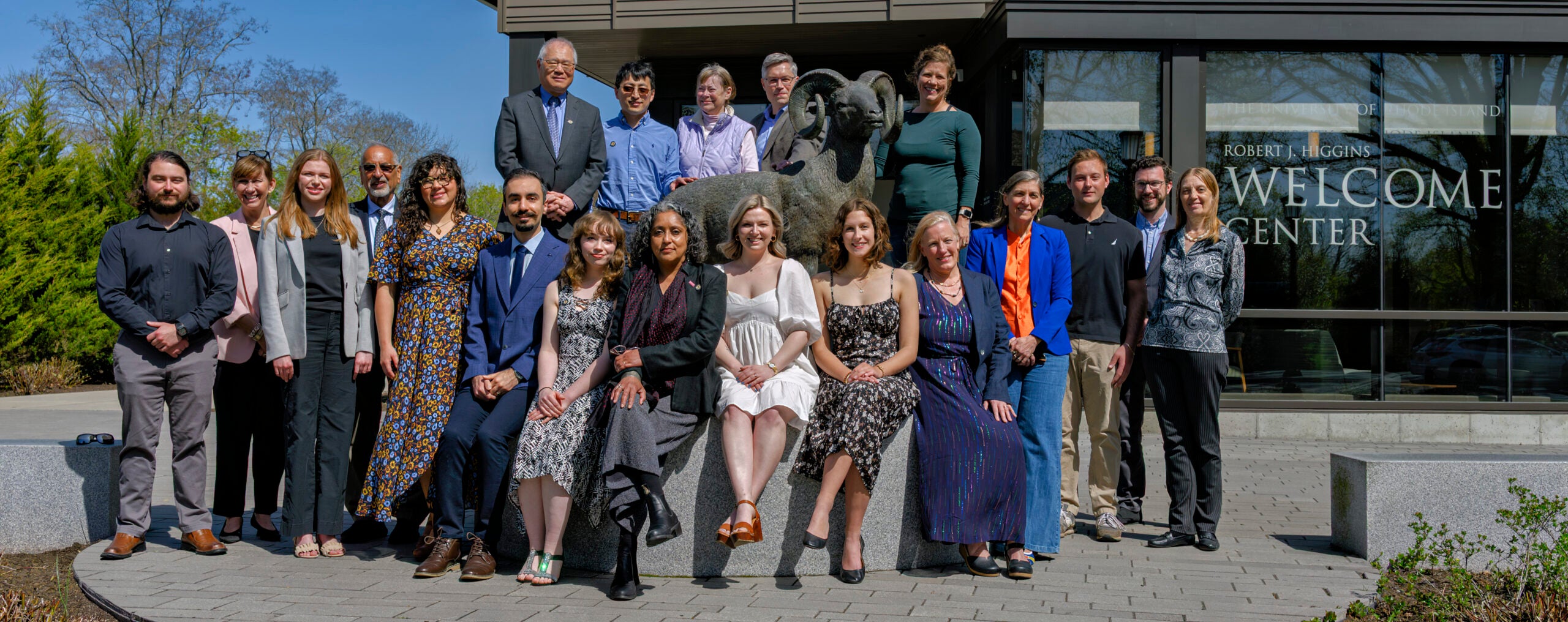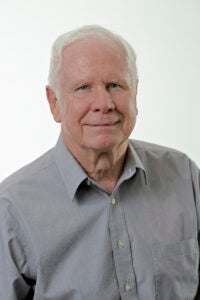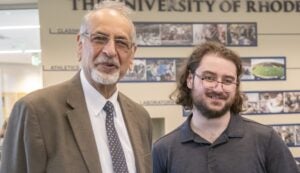Please join us in congratulating the
2025 Research, Scholarship, and Intellectual Property
Excellence Awards and URI Photo Contest Recipients
For their commitment to their studies, their College, the University community in general, and for serving as a positive role model and resource to all, The University of Rhode Island recognizes the 2025 Research and Scholarship and Intellectual Property Excellence Award recipients.
Undergraduate Student Research and Scholarship Excellence Award
Social Sciences, Arts, and Humanities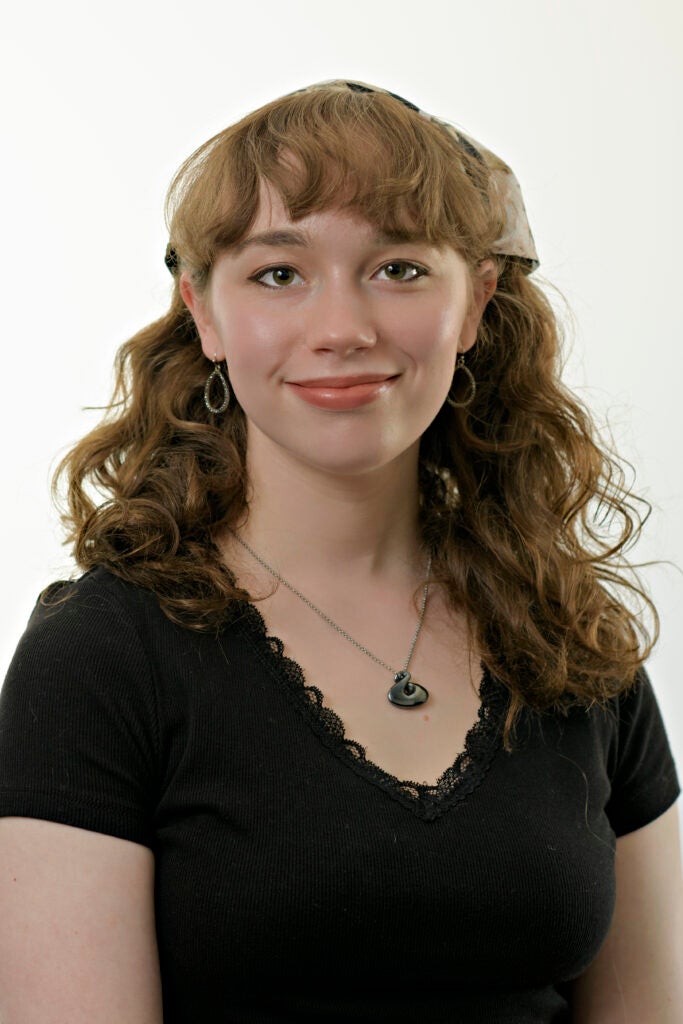
ANYA DETONNANCOURT
Department of Art and Art History, College of Arts and Sciences
Anya Detonnancourt is an exemplary student, with a 3.76 GPA, who demonstrates an advanced level of intellectual curiosity, as well as critical and creative thinking. Her faculty mentor, Assistant Professor Erin McCutcheon, stated that Detonnancourt’s ability to synthesize academic inquiry with creative practice demonstrates an advanced level of interdisciplinary research skills that have made a significant and positive contribution to the study of art and gender and women’s studies on campus.
Inspired by her own experiences and a broader concern for women’s health, she combined traditional research methods with firsthand data collection. Her goal was to create an exhibition of original artworks that would make women feel less alone in their experience with shame or fear in the medical world and empower them to seek treatment earlier.
Detonnancourt was dedicated to capturing the intersectional experiences of participants to understand how bodily shame and medical trauma connect with racism, classism, homophobia, and sexism. She surveyed over 100 URI community members about their experiences with medical trauma, successfully navigating a rigorous six-month IRB process and demonstrating her ability to engage with research ethics at a professional level. She translated her findings into a compelling body of original multidisciplinary artworks—paintings, soft sculptures, media installations, and interactive elements—that critically engage with themes of bodily autonomy and patient dignity. Her exhibition, “Betrayed Bodies: The Price of Care,” was displayed in Pastore Hall from March 18–22, 2025.
Detonnancourt is not only advancing knowledge about women’s health and medical bias, but also demonstrating the power of creative scholarship as a tool for social awareness and change at the local level. She embodies the qualities we strive to cultivate in all of our students. Her work is a strong testament to her confident yet thoughtful artistic process, in which she seamlessly integrates conceptual rigor with a compelling visual experience.
Undergraduate Student Research and Scholarship Excellence Award
Life Sciences, Physical Sciences, and Engineering
MORGAN BECK
Departments of Physics, Mathematics and Applied Mathematical Sciences, and Modern and Classical Languages and Literatures, College of Arts and Sciences
Morgan Beck is an exceptionally talented and motivated undergraduate, currently pursuing dual Bachelor of Science degrees in physics and applied mathematics, with a minor in French. She has consistently demonstrated outstanding academic achievement, maintaining a 4.0 GPA while excelling in a rigorous curriculum.
Her major professors, Michael Puerrer and Scott Field, state that she distinguished herself as a top-performing student. Her ability to grasp challenging material, engage in deep discussions, and apply computational techniques to physics problems was unparalleled. She demonstrated an exceptional ability to analyze and implement complex concepts. Her commitment to academic excellence extends beyond coursework. She regularly attended departmental colloquia, including the faculty search in gravitational wave astrophysics, showcasing enthusiasm for cutting-edge research. Her technical skills are exceptional—being highly proficient in Python, JupyterLab, NumPy, SciPy, Matplotlib, and JAX––and she is skilled in IBM Qiskit and LaTeX. Her ability to write and execute complex simulations is comparable to that of many graduate students. She even identified subtle errors in the textbook.
Beyond academic achievements, she brought a positive and encouraging energy to the classroom. Her enthusiasm for the material was infectious, inspiring peers and fostering an engaging learning environment.
Beck’s current project is at the intersection of gravitational wave modeling and machine learning, focusing on neural ordinary differential equations. Gravitational waves are subtle vibrations in spacetime, which can be identified by sensitive detectors. Her work will enable better characterization of signals from binary black hole systems. Her research contributes to expanding waveform models beyond traditional vacuum solutions, incorporating environmental effects such as dark matter interactions and third-body perturbations—areas crucial for understanding extreme mass ratio inspirals and supermassive black hole binaries. This work has significant implications for astrophysics, particularly for the Laser Interferometer Space Antenna, a NASA mission set for 2035.
Graduate Student Research and Scholarship Excellence Award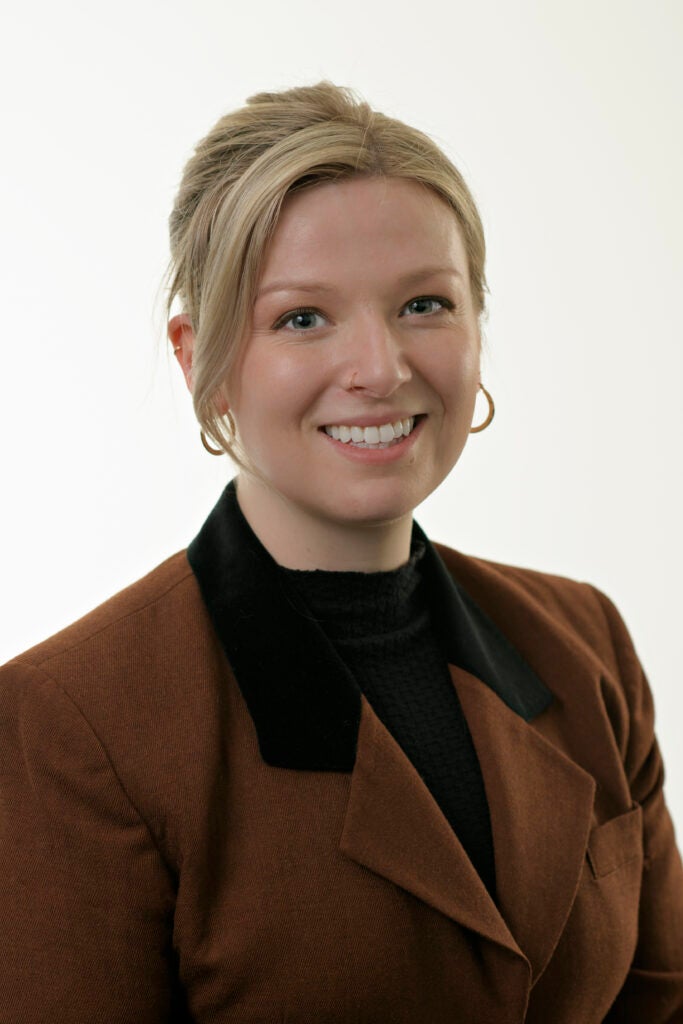
Social Sciences, Arts, and Humanities
REINA KIEFER
Department of Psychology, College of Health Sciences
Reina Kiefer is known for her passion, remarkable intellect, and dedication to improving the lives of individuals impacted by sexual violence. Her faculty mentor, Associate Professor Nicole Weiss, describes her as having an unparalleled drive for success and advanced decision-making abilities.
Kiefer has been responsible for a wide range of research activities, including recruiting and retaining community/undergraduate participants, conducting in-depth study interviews, and managing large datasets. During her first year of doctoral studies, she served as second author on a landmark meta-analysis examining emotion regulation and substance use. Kiefer was responsible for reviewing thousands of articles, extracting and coding relevant data, and learning complex and multifaceted statistical analyses. When the team encountered a major analytic error, she swiftly re-ran all analyses. This manuscript is now published in Drug and Alcohol Dependence and has been cited over 200 times to date.
Kiefer has 29 peer-reviewed publications; she has contributed to seven symposia and has presented 55 research posters at national and international conferences. In 2023, she was awarded an F31 Ruth L. Kirschstein Predoctoral Individual National Research Service Award—the most prestigious grant awarded to clinical psychology doctoral candidates, signaling strong promise for a successful research career. In 2024, she received an American Psychological Foundation COGDOP Graduate Research Scholarship to further support her dissertation.
Kiefer’s F31—funded by the National Institute on Alcohol Abuse and Alcoholism—advances her research program focused on mechanisms that confer risk for college campus sexual assault by using cutting-edge methods and data analytic techniques to understand how strong emotion and alcohol intoxication intersect to influence sexual assault risk perception.
Kiefer is also a dedicated mentor. She guided one undergraduate through developing a first-author manuscript and has mentored many others in developing posters for research conferences.
She has accomplished all of this while maintaining a perfect 4.0 GPA.
Graduate Student Research and Scholarship Excellence Award
Life Sciences, Physical Sciences, and Engineering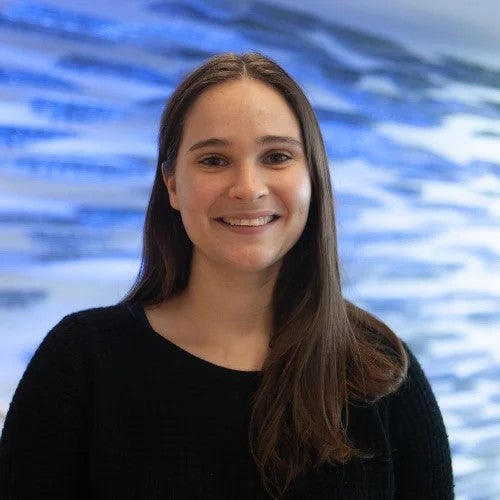
ANNA M. SCHRECENGOST
Graduate School of Oceanography
Anna M. Schrecengost is a creative and innovative scientist who has initiated new research directions at URI. Her ability to integrate complex information and generate novel research questions has positioned her as a rising leader in oceanography. Her faculty mentor, Associate Professor Roxanne Beinart, shared that Schrecengost’s research focuses on understanding how the genetic diversity of anaerobic ciliates and their methane-producing partners varies geographically and across coastal habitats, which is key to understanding the ecology and evolution of this biogeochemically important group.
At URI, Schrecengost has developed a unique and locally focused collection of anaerobic ciliates, microbes that few scientists in the world cultivate. She created inventive laboratory and computational methods, including single-cell manipulation methods and in-depth genomic analyses, which boosted our understanding of the evolution and ecology of microbe-microbe partnerships. Her work has shown that evolutionary history or environment can play a role in determining these partnerships at differing taxonomic levels.
She has also designed a global-scale project using public sequencing datasets to survey anaerobic ciliates, representing the first such study of its kind. This contribution not only advances knowledge of these microbes but also provides an open-source pipeline for other researchers to study microbial diversity at this scale.
Schrecengost’s outstanding research is complemented by her impacts on the URI community. She developed creative ideas and initiatives with the goal of deeply engaging the computational research community on the Bay Campus while working with the Center for Computational Research. She has been an excellent mentor to five undergraduate students and provided writing support, editing, and mentorship for the graduate community as a tutor at the Graduate Writing Center.
Finally, Schrecengost has a passion for science communication through art. She has a strong collaboration with a RISD art student, and together they created a book with illustrations about coastal sediment microbiology to use as outreach materials.
Early Career Faculty Research and Scholarship Excellence Award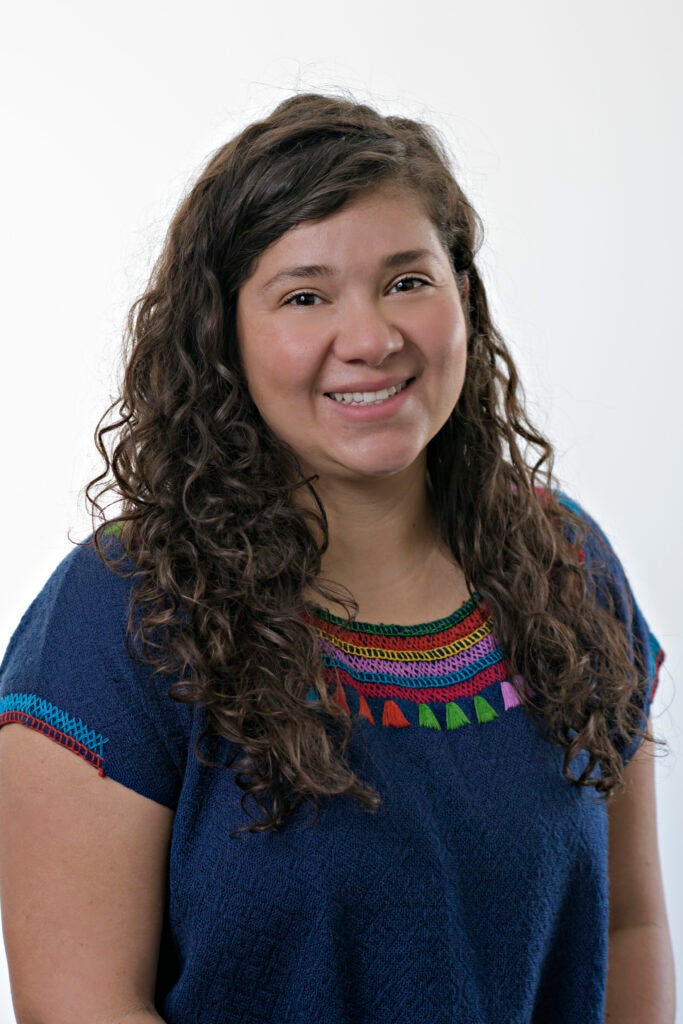
Social Sciences, Arts, and Humanities
ASSISTANT PROFESSOR MELVA TREVIÑO PEÑA, Ph.D.
Department of Fisheries, Animal, and Veterinary Sciences, College of the Environment and Life Sciences
Assistant Professor Melva Treviño Peña is a coastal human geographer specializing in qualitative ethnographic research methods. She prioritizes working with coastal communities from marginalized and socially vulnerable backgrounds, both domestically and internationally.
Treviño Peña’s exceptional scholarly achievements are marked by strategic, community-engaged research and meaningful partnerships spanning New England, Micronesia, and Peru, resulting in numerous publications and funded grants. Through a wide range of projects, she has cultivated strong relationships with diverse resource users, community-based organizations, scientists, environmental advocates, and other key coastal stakeholders working on a variety of marine resource management issues, including equitable shore access, fisheries and food security, and self-provisioning activities and livelihoods.
Her collaborators emphasize her commitment to interdisciplinary, impactful, and policy-relevant research. Faculty note that Treviño Peña’s scholarly contributions are increasingly recognized through awards both within and beyond URI, as well as numerous invitations to workshops, panels, advisory boards, and committees. These honors underscore her role as a leading researcher in inclusive marine resource management and ocean conservation strategies.
As a social scientist, Treviño Peña has made exceptional contributions to understanding the intricate relationships between human communities and marine ecosystems. Her appointment as the first social scientist and first Latinx person to the Rhode Island Marine Fisheries Council underscores the recognition of her scholarly expertise and positions her to influence state policy while at the same time building valuable connections for her research. She maintains a rigorous commitment to diversity, equity, inclusion, justice, and accessibility, which is not merely a peripheral consideration, but a core value to her in all that she does. Her service strategically aligns with her research interests and advances important institutional priorities. Her stellar mentorship of numerous graduate students and her unparalleled dedication to the meaningful support of underrepresented scholars is second to none.
Early Career Faculty Research and Scholarship Excellence Award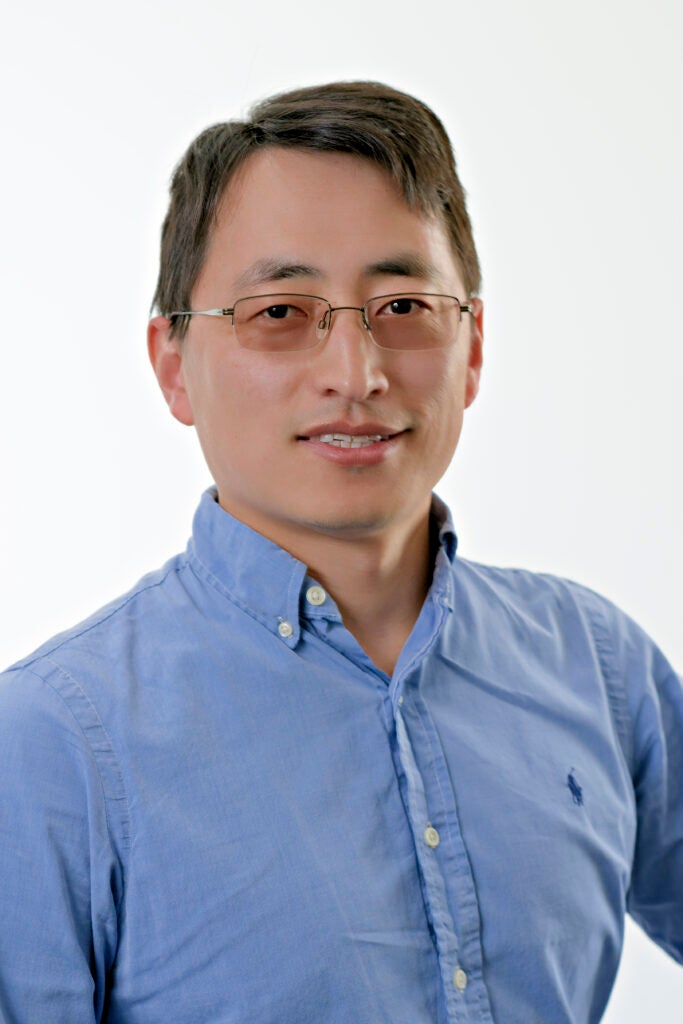
Life Sciences, Physical Sciences, and Engineering
ASSISTANT PROFESSOR WENCHAO GE, Ph.D.
Department of Physics, College of Arts and Sciences
Assistant Professor Wenchao Ge has exceeded all expectations in research, teaching, and service. His contributions have not only elevated the Department of Physics, but have also positioned URI as an emerging leader in quantum information science. His research excellence is demonstrated by four published papers in prestigious journals since joining URI, with two more under review. Notably, his paper, “Classical-Nonclassical Polarity of Gaussian States,” published in Physical Review Letters, is generating significant attention within the quantum computing community and has been highlighted in multiple media outlets.
Beyond publications, Ge has secured substantial external funding, including an $800,000 NSF grant through the ExpandQISE program, aimed at establishing URI as a hub for quantum information science and engineering. Additionally, as a co-PI on the NSF ExLENT grant, he is playing a crucial role in efforts to create career pathways in quantum information science and technology. His impact on quantum research at URI is further underscored by the development of his research group, which includes a postdoctoral scholar, four graduate students, and four undergraduate researchers. He also mentors high school students.
Ge is an outstanding community builder. His leadership on the New England Section of the American Physical Society (APS), including his term as Secretary/Treasurer of APS NES, and his role in organizing World Quantum Day at URI, demonstrate his commitment to fostering a vibrant quantum community. His coordination of the Physics Department seminar series, with a particular emphasis on quantum computing, sensing, and communication, has brought renowned speakers to URI, further enriching our research environment.
Ge embodies the highest ideals of scholarly excellence, mentorship, and institutional leadership. His achievements have already had a profound impact on URI, and his potential to shape the University’s quantum future is immense.
Advanced Career Faculty Research and Scholarship Excellence Award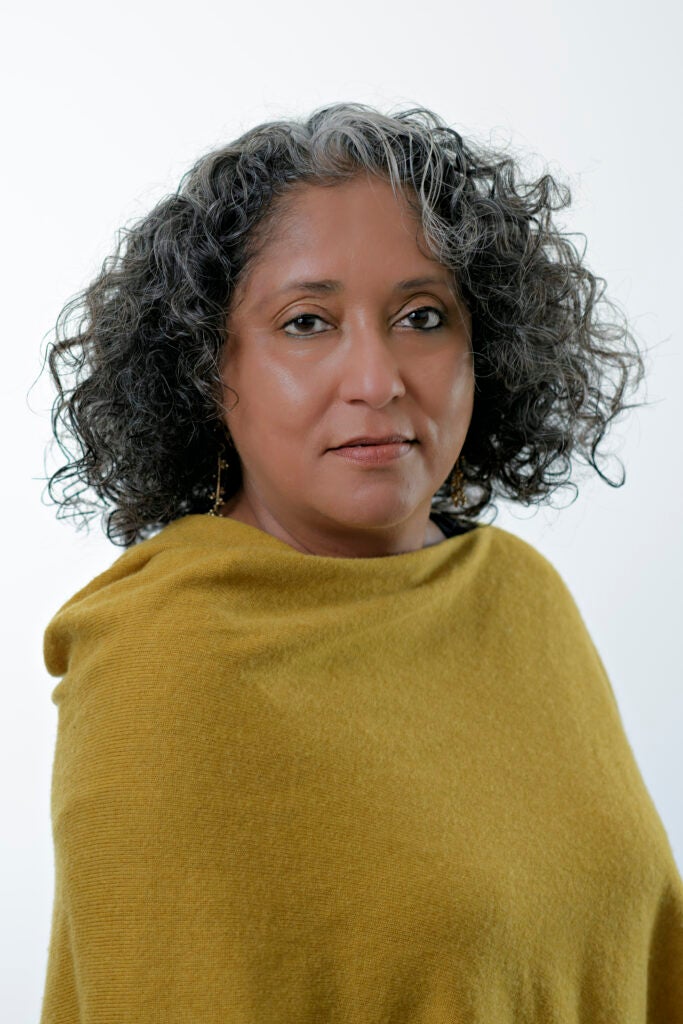
Social Sciences, Arts, and Humanities
PROFESSOR ANNU PALAKUNNATHU MATTHEW, MfA
Department of Art and Art History, College of Arts and Sciences
Since joining URI in 1998, Professor Annu Palakunnathu Matthew has built an exceptional career as an artist, researcher, and educator. Her creative work reexamines historical narratives in the U.S. and South Asia and is intellectually rigorous and deeply resonant. Her research contributions, which span multiple disciplines and artistic mediums, have earned her widespread recognition and solidified her reputation as a leader in the field.
Matthew’s research accomplishments are exemplary, reflecting not only the quality of her work but also its significant influence within the academic and artistic communities. Her contributions to research and scholarship include an impressive array of monographs, publications, national and international exhibitions, residencies, and grants, including two Fulbright fellowships. Notable exhibitions include her retrospectives at the Newport Art Museum, the Royal Ontario Museum, and the Bhau Daji Lad Museum in Mumbai. Exhibitions at esteemed institutions such as the Victoria & Albert Museum, MFA Boston, MFA Houston, RISD Museum, and the Smithsonian are testaments to her influence in the field.
What is particularly remarkable about Matthew is her ability to sustain such a high level of creative and scholarly production while also making meaningful contributions to the University through teaching and service. Her dedication to mentoring students, engaging in critical discourse, and fostering an environment of intellectual curiosity is invaluable to our institution.
Her unwavering commitment to her field, combined with the global resonance of her work, is a testament to the power of artistic research to challenge perspectives, preserve cultural narratives, and inspire future generations. Matthew’s trajectory is one of continuous impact and innovation, embodying the highest creative and scholarly achievement standards.
Advanced Career Faculty Research and Scholarship Excellence Award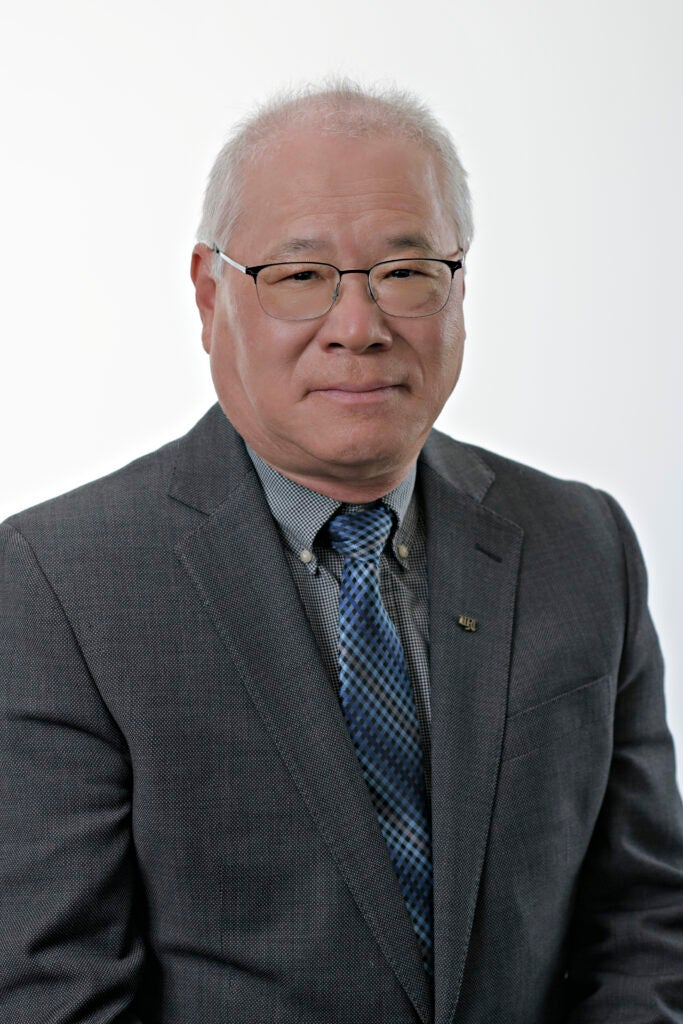
Life Sciences, Physical Sciences, and Engineering
PROFESSOR BONGSUP CHO, Ph.D.
Department of Biomedical and Pharmaceutical Sciences, College of Pharmacy
For more than three decades Professor Bongsup Cho has been a dedicated URI leader, mentor, and scholar.
Cho is the principal investigator and leader of the National Institutes of Health (NIH)-funded Institutional Development Award (IDeA) Network of Biomedical Research Excellence program (RI-INBRE). The program’s primary goal is to strengthen the biomedical research expertise and infrastructure of URI and its nine partner institutions.
The program has had profound and transformative impacts on Rhode Island’s biomedical research capacity and opportunities. RI-INBRE has provided start-up funds to launch the research careers of junior faculty, as well as funding for training the next generation of biomedical scientists and research infrastructure improvements. The RI-INBRE program has been continually funded by the NIH since 2001 and has secured over $86 million in research funding for the state. The program has provided competitive research grants to 225 faculty, facilitated the training of more than 2,300 students, and funded 826 scientific projects.
In addition to his role as the program director of RI-INBRE, Cho has continued to lead an active and highly productive research program since joining URI in 1991. A chemical biologist, medicinal chemist, and cancer expert, he studies cellular DNA damage and the molecular mechanisms underlying the protein-DNA interactions involved in DNA repair and replication. The NIH and the American Cancer Society have continually funded Cho’s research program. He has published extensively on chemical carcinogenesis and molecular toxicology and presented at various national and international conferences. He has served as the associate dean for research and graduate studies at the College of Pharmacy. He has mentored countless undergraduate and graduate students, postdoctoral fellows, and junior faculty.
Cho is an example of hard work, dedication, and a celebration of the values that make our University community special.
Faculty Intellectual Property Excellence Award
PROFESSOR ARIJIT BOSE, Ph.D.
Department of Chemical, Biomolecular, and Materials Engineering, College of Engineering
Professor Arijit Bose’s sustained and significant intellectual contributions to the field of energy storage and nanotechnology are exceptional. Colleagues from MIT, Berkeley, Brown, and the Indian Institutes of Technology have praised his work. He is a Distinguished Engineering Professor at URI. At the Indian Institutes of Technology, Kanpur, he serves on the Advisory Board of the Kotak School of Sustainability and is a Distinguished Visiting Professor in the Department of Chemical Engineering.
He addresses demanding problems in three ways: the bold pursuit of new needs and opportunities, nurturing long-term teams and mentoring graduate students, and development and use of state-of-the-art characterization methods needed for the problems. In this integrated way, he has worked to understand and characterize the cooperative interaction of surfactants, polymers, and colloids in a large range of applications—from creating nanostructured materials, understanding wetting by surfactant solutions using a combination of experiments and numerical simulations and the creation of novel particle stabilized emulsions for applications in deep-sea oil spills. His current work, in collaboration with several colleagues at URI, is in the development of safe, stable, lithium-ion batteries and magnesium-metal batteries, and the use of 3-D solvent-free printing for manufacturing high-performance electrodes for batteries. He has proudly supervised 20 Ph.D. and 28 M.S. students, all of whom have gone on to exceptional careers. His publications have been cited over 9,000 times, and his Google Scholar h-index is 50.
Bose holds 9 U.S. patents and has 4 others under review. He co-founded Audiance, Inc., in 2017 with colleagues at Berkeley and Stanford, to develop safe, compact, low-capacity fade rechargeable batteries for active implantable medical devices and serves as Audiance’s chief scientific advisor. Audiance started operations in 2019 and is currently funded by the U.S. National Institutes of Health, National Aeronautics and Space Administration, and the U.S. Department of Energy, as well as the State of Rhode Island. He is also leading the NIUVT focus group on underwater energy systems. He has formed strong teams with faculty from UCONN and local industry and is contributing to the needs of the U.S. Navy.
His former student states: “He wasn’t just a source of knowledge and expertise; he became a beacon of intellectual guidance.”
Intellectual Property Awards
U. S. Issued Patents
Department of Physics, College of Arts and Sciences
Professor Oleg A. Andreev, Professor Yana K. Reshetnyak, Research Assistant Professor Anna Moshnikova, and Professor Donald Engelman, Yale University
for their U.S. Issued Patents: pH Low Insertion Peptide Targeted Delivery of Potent Cytotoxic Compounds



Department of Chemistry, College of Arts and Sciences 
Associate Dean and Professor Jason Dwyer
for his U.S. Issued Patents: Method for Ablating or Roughening Wafer Surfaces, with Y.M. Nuwan, D.Y. Bandara, and Brian Sheetz; and
Ohmic Nanopore Fabrication and Real-Time Cleaning, with Buddini Iroshika Karawdeniya, Y.M. Nuwan, D.Y. Bandara, MinJun Kim, and Jugal Saharia
Department of Chemistry, College of Arts and Sciences
Professor Jimmie C. Oxley, Professor James L. Smith, and students Taylor Busby and Athina Kominia
for their U.S. Issued Patent: Plasticized Flexible Pyrotechnic Material

Department of Mechanical, Industrial, and Systems Engineering, College of Engineering
Professor Arun Shukla, and former student Dillon T. Fontaine
for their U.S. Issued Patent: Structures and Methods for Mitigating Implosion Pressure Spikes
Department of Ocean Engineering, College of Engineering and Graduate School of Oceanography
Professor Brennan T. Phillips and Colleague Jim Owens, Nautilus Defense, LLC
for their U.S. Issued Patent: Fiber Optic Reel System
University of Rhode Island Research and Scholarship Photo Contest Awards
First Place
“Working Hard–Hardly Working”
Renato Borras-Chavez, Postdoctoral Researcher
Department of Natural Resources Science, College of the Environment and Life Sciences
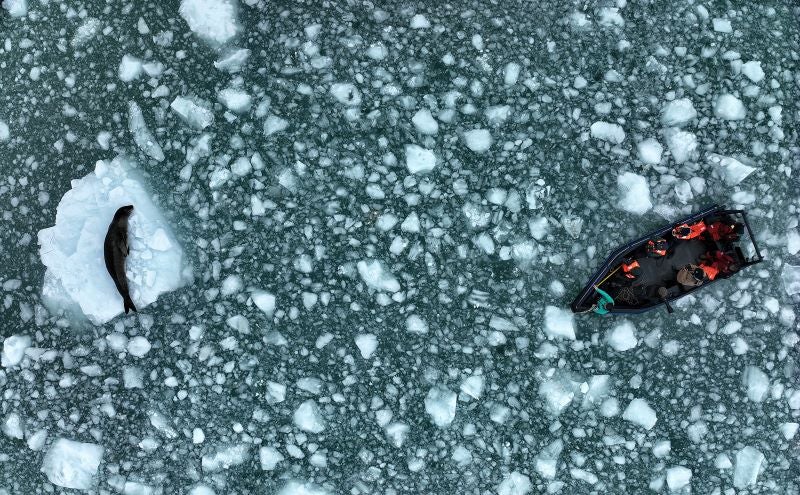 Renato Borras-Chavez was part of a team conducting fieldwork in Parry Fjord, an isolated part of Patagonia, Chile, to study the ecology of leopard seals and their genetic connection to Antarctic populations. The fieldwork was supported by a National Science Foundation grant, led by Sarah Kienle, assistant professor of natural resources science.
Renato Borras-Chavez was part of a team conducting fieldwork in Parry Fjord, an isolated part of Patagonia, Chile, to study the ecology of leopard seals and their genetic connection to Antarctic populations. The fieldwork was supported by a National Science Foundation grant, led by Sarah Kienle, assistant professor of natural resources science.
The image captures a critical moment from the expedition. After hours of patrolling the freezing waters looking for animals, the team came across a female leopard seal resting on an iceberg. “We were focused, pressured—piloting a drone, collecting data, and preparing to take a sample—but she was undisturbed, basking in the icy stillness. The contrast was clear: We were working hard, while she was hardly working,” says Borras-Chavez.
The judges praised the composition, texture, and balance; One said, “Such an incredible capture and backstory. I love a good drone photo, and this one is beautiful. The perfect composition between the boat and the seal, and the chunks of ice really set the scene.”
Second Place
“Aurora Borealis Dancing Over the URI Bay Campus Beach”
Amirali Momeni, Doctoral Student
Department of Natural Resources Science, College of the Environment and Life Sciences
 Amirali Momeni’s research focuses on science communication, specifically how astronomy influencers use social media to engage the public. His photo of the aurora borealis—also known as the Northern Lights—taken at the URI Bay Campus beach in Narragansett in October 2024, was a way to put his studies into practice. “Auroras are typically seen at much higher latitudes. However, thanks to a powerful solar storm coinciding with the peak of the solar cycle, it became visible much farther south than usual,” Momeni says.
Amirali Momeni’s research focuses on science communication, specifically how astronomy influencers use social media to engage the public. His photo of the aurora borealis—also known as the Northern Lights—taken at the URI Bay Campus beach in Narragansett in October 2024, was a way to put his studies into practice. “Auroras are typically seen at much higher latitudes. However, thanks to a powerful solar storm coinciding with the peak of the solar cycle, it became visible much farther south than usual,” Momeni says.
The shimmering curtains of light are caused by the interaction of charged particles from the sun with atoms in the Earth’s atmosphere. The vibrant colors are a result of atmospheric gases being excited by these solar particles. “In essence, this photograph encapsulates the core of my research: the power of visual communication to inspire awe, connect science with the public, and ultimately promote engagement with the wonders of astronomy.”
The judges praised the color and composition; One said, “This one is a beautiful photo of a rare event, and to have it captured on URI’s campus makes it even more special and deserving of a finalist spot.”
Third Place
“Misty-Eyed Long-Tailed Macaque”
Paige Hojdar ’27
Departments of Marine Biology and Marine Affairs, College of the Environment and Life Sciences
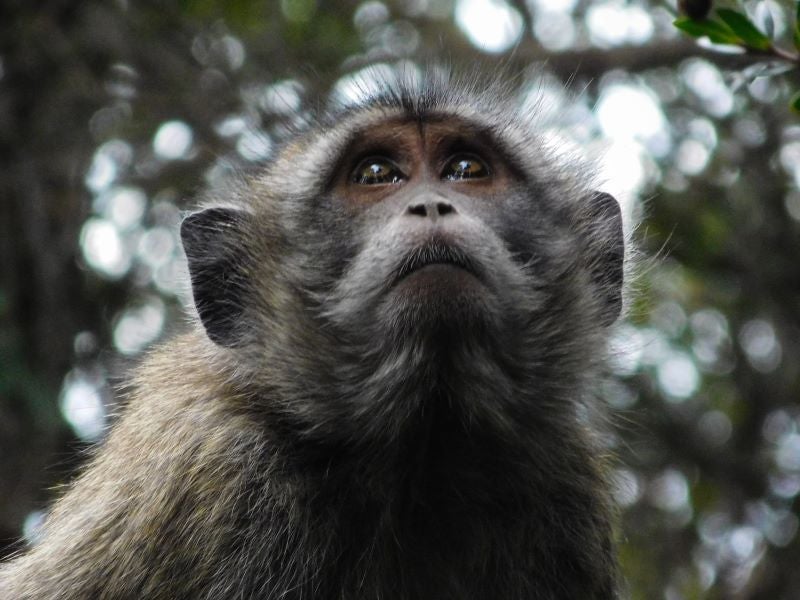 Paige Hojdar traveled to Indonesia with her classmates in the Winter J-term course “Biodiversity, Geology, and Water Resources.” In Indonesia, they hiked Mount Bromo, an active volcano in East Java. As they trekked down a hidden path to get a better view, they heard rustling in the trees. They paused and spotted a group of macaques. “Enamored by their playful personalities,” says Hojdar, “I sat in the mud and stared, camera poised and zoomed in tight. This monkey stayed still for a long while, eventually lifting his eyes to the heavens.”
Paige Hojdar traveled to Indonesia with her classmates in the Winter J-term course “Biodiversity, Geology, and Water Resources.” In Indonesia, they hiked Mount Bromo, an active volcano in East Java. As they trekked down a hidden path to get a better view, they heard rustling in the trees. They paused and spotted a group of macaques. “Enamored by their playful personalities,” says Hojdar, “I sat in the mud and stared, camera poised and zoomed in tight. This monkey stayed still for a long while, eventually lifting his eyes to the heavens.”
Hojdar incorporated this photo into her group’s final project on marine pollution in Indonesia. “This course emphasized the importance of protecting these environments,” she says, “especially in areas of high tourism.”
The judges praised the engaging eye contact; One said, “This portrait effectively emphasizes the subject’s eyes, using a small depth of field to create a pleasing out-of-focus background.”
Honorable Mention
“The Glow of the Neuromasts”
Gus Bienenfeld ’25
Departments of Marine Biology, and Aquaculture and Fisheries Science, College of the Environment and Life Sciences
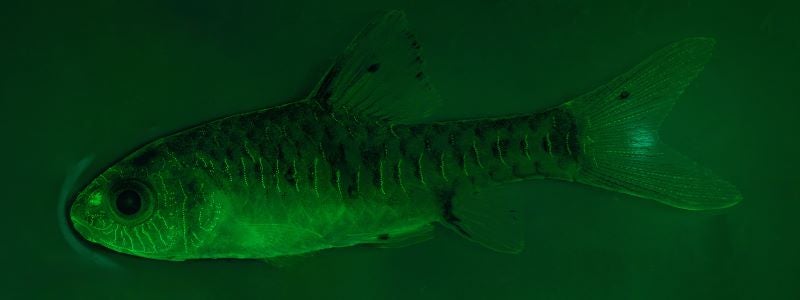 Gus Bienenfeld works in the lab of Professor Emerita Jacqueline Webb, focusing on the imaging, mapping, and analysis of superficial neuromasts—sensory receptor organs on fish that detect movement or vibrations in the water—in species of fish available in the aquarium trade. This photo is a composite image of a checkered barb with a mitochondrial binding stain that allows for visualization and quantification of neuromasts making up the fish’s lateral line system.
Gus Bienenfeld works in the lab of Professor Emerita Jacqueline Webb, focusing on the imaging, mapping, and analysis of superficial neuromasts—sensory receptor organs on fish that detect movement or vibrations in the water—in species of fish available in the aquarium trade. This photo is a composite image of a checkered barb with a mitochondrial binding stain that allows for visualization and quantification of neuromasts making up the fish’s lateral line system.
“This image highlights both the complexity and beauty of the mechanosensory lateral line system of fishes,” Bienenfeld says. “This species in particular exhibited superficial neuromasts all over the body with perfect lines radiating from around the eye on the cheek, on both the pre-operculum and operculum, every single scale in the lateral line series, as well as in horizontal lines on the caudal fin.”
One judge noted that the image is “a great example of something fundamentally scientific, yet aesthetically powerful.”
Honorable Mention 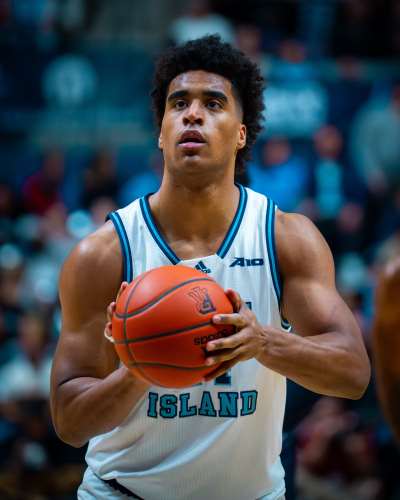
“A Moment of Focus”
Enzo Zambito ’26
Department of Sports Media and Communication, College of Arts and Sciences
Enzo Zambito took this photo of URI center David Fuchs at the free-throw line on February 26, 2025, during the URI vs. Dayton men’s basketball game. The image highlights Fuchs’ concentration as he is surrounded by cheering fans. “Fuchs is locked in with intense focus as he prepares to take his shot,” says Zambito. “The lighting and composition emphasize the intensity of the moment.”
For Zambito, capturing moments like this allows him to combine his passion for sports with his skills in photography and storytelling. “The photo not only showcases the game itself but also represents the intensity and emotions that define sports,” says Zambito.
The judges agreed, commenting that the photo shows “crisp focus and a great moment,” and is a “great sports shot.”
Honorable Mention 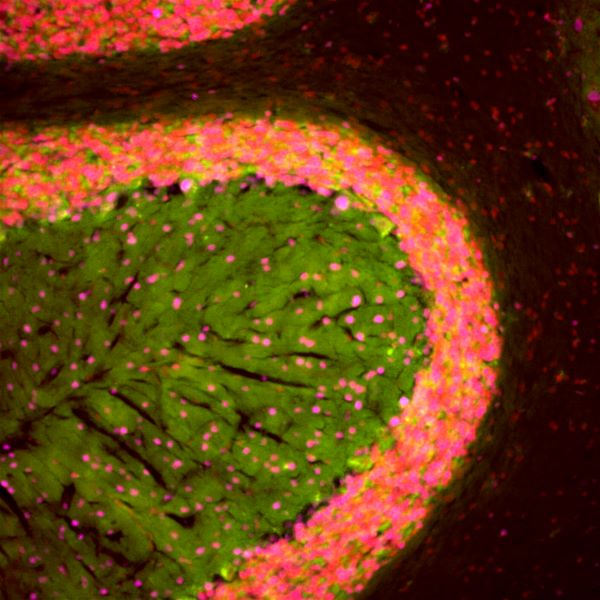
“Cerebella-Melon”
Emily Potts and Alicia Collins, Doctoral Students
Department of Interdisciplinary Neuroscience, College of Pharmacy
Emily Potts and Alicia Collins took this immunohistochemistry (IHC) image of a rat cerebellum in the lab of Claudia Fallini, assistant professor of cell and molecular biology. There, they study how changes to essential proteins such as TDP43 contribute to neurodegenerative diseases such as Amyotrophic Lateral Sclerosis (ALS), frontotemporal dementia, and Alzheimer’s disease.
“The image distinctly showcases the layered organization of the cerebellum,” say Potts and Collins. “This staining combination provides valuable insight into neuronal structure, cellular organization, and potential neurodegenerative processes in the cerebellum. This helps us uncover the molecular mechanisms underlying neurodegeneration, identify affected neuronal populations, and explore potential therapeutic targets to mitigate disease progression.”
One judge noted that the image, paradoxically, is “a beautifully soft abstraction for such insidious diseases,” and that it “offers a kind of understanding and hope for future cures.”

